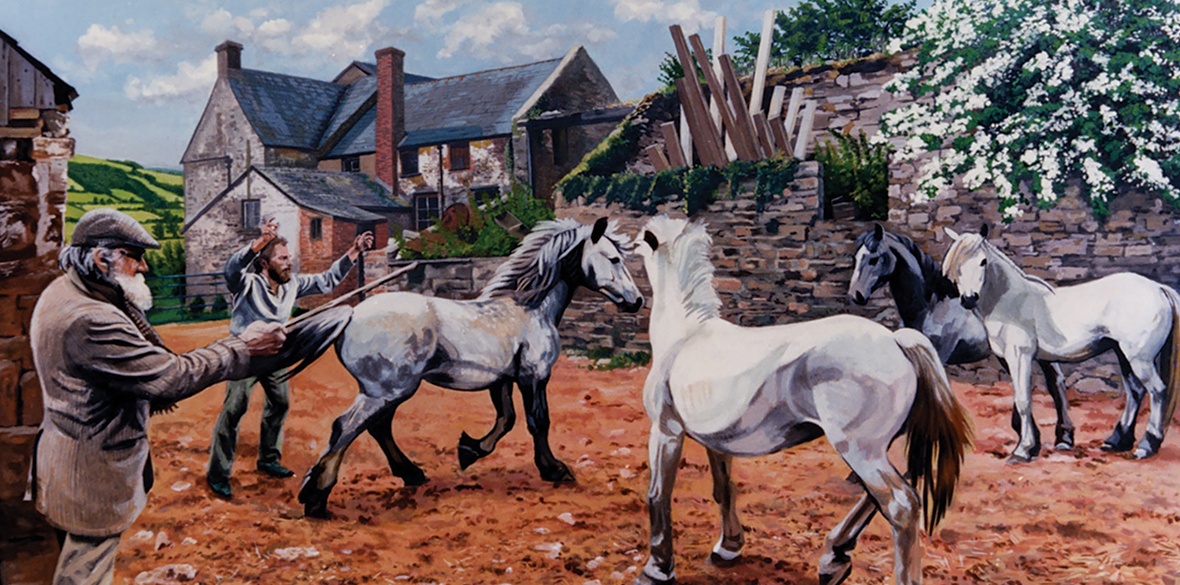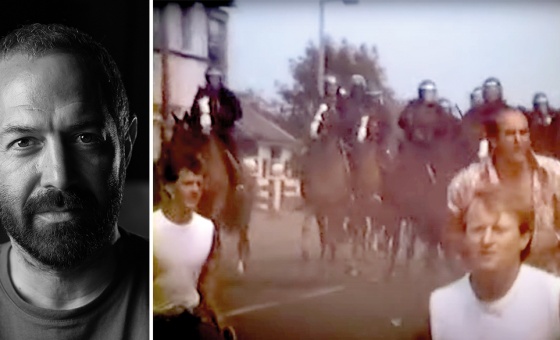This is the last article you can read this month
You can read more article this month
You can read more articles this month
Sorry your limit is up for this month
Reset on:
Please help support the Morning Star by subscribing here
ISAAC EVANS has gone now. He died in 2006.
Yet when I visit my mate Chris, his son, who now runs the farm alone, his dad is alive in my mind. How could he not be? He was such a big presence, with his beard and his cap, and at one stage a dowsing stick, talking the hind leg off a donkey, as he always did. And how often do you meet a socialist farmer?
When I recently visited Chris I asked him to tell me how many socialist farmers he knew in this rolling Welsh border country east of Pontypool.
“None”, he said, though he did reflect that there may be some who hide it.
Over most of our countryside nearly all small farmers have gone, and rural farm labour has mostly gone, too. On the best land foreign labour takes the casual jobs where wages are so awful that UK workers won’t touch them.
Farm sizes swell and swell – from the 30 acres on which you could still make a living from dairy farming even in the 1960s, to 600 acres, 1,000, 2,000-plus acres nowadays.
Rich good lifers and a range of corporate parasites take ever larger chunks of more marginal lands, whether it’s in the hills of Wales or the hills of the Weald.
You can’t expect those people to support land nationalisation.
But Isaac supported it. And cared about nature. And he supported the right to roam. The only trouble you’d have been in if you met Isaac on the farm was that he’d still be yarning with you in two hours time!
Isaac got the New Barn Farm tenancy in 1950, having convinced the Liberal-supporting land agent that he shared his politics. His father was both a miner and a tenant farmer himself, having run a dairy smallholding near Blackwood and worked his shift in the mine, before taking a farm tenancy on a landed estate some miles up the river from Usk. So Isaac had both a working-class and a farming heritage.
In the early years I knew Isaac and Chris their farming lives were be-devilled by insecurity. The landlords served Isaac with a “breach order” which imposed a whole list of remedial works on him for spurious failures to maintain the farm in good condition. All those hedges that didn’t serve any stock containment function were to be made stock-proof.
Isaac’s father’s landlord tried the same thing. Chris was forced to return from working in Reading to slog through the list of unnecessary works. Isaac’s far hay meadow was sold to a neighbour and the new owner slapped a “Certificate of Bad Husbandry” on Isaac for its condition. It was a lovely archaic flower meadow managed traditionally.
Isaac mobilised the local Friends of the Earth and got good local media cover, but it was to no avail. He was evicted from the meadow.
With his father and brothers and several other tenant farmers from South Wales they formed a Farm Tenants Association – this was before the current Tenant Farmers Association was set up. It’s a very different kettle of fish.
Isaac went up to London and persuaded Chris Brasher, the Olympic runner and BBC manager, to do a film about landlordism. The result was the 1974 BBC One film Who is Buying Up Britain?
Isaac’s dad’s landlord didn’t like it, sued Chris Brasher for libel and won a £30,000 payout.
From their joint membership of the Labour Party agriculture committee, Isaac, with the redoubtable MPs Joan Maynard (or “Stalin’s Granny” as her detractors called her), Gavin Strang and others lobbied for an end to winkling techniques and proper successional rights for farm tenants’ families.
They won them in Jim Callaghan’s Agriculture (Miscellaneous Provisions Act) of 1976. So for a while the level of security for tenant farmers (three successions) and council housing tenants (three successions) remained the same.
Now all that is undone for council tenants, but tenant farmers on older farm tenancies still have rights of succession.
Obliged to go into teaching after the bank pulled his overdraft in 1970, Isaac joined a Newport comprehensive. When required to write reports on the children he asked “who can see them?” and was told “they stay on file.” Secret.
That was the start of a campaign that, with his NUT pals in the school, made contact with a range of other folk concerned about secrecy in education and other services, the economy and the state, from investigative journalists to family members.
His farmer brother John even had a racehorse named Secret Dossier. That long campaign included an appearance on Channel Four’s After Dark in the 1980s, and a stream of newspaper letters and articles.
The passing of the Freedom of Information Act in 2000 encompassed most of what he had asked for.
When I think about Isaac Evans’s life two pictures readily come to mind.
One picture is of him ruefully saying “It’s a sad thing to want to serve your community, but to be stopped from doing so.” He was thinking of his repeated attempts at election for Labour to the parish council (Gwehelog), town council (Usk) and county council (Monmouthshire).
He got within a few votes of election after one superb campaign. But he never won. After his defeat standing for his parish council — dominated by Tories, who mobilised heavily against him, he overheard one Tory lady saying “what a complete waste of time that was!”
Used to a regime of uncontested single candidate “elections,” she didn’t hide her disgust at having to do some actual democratic work.
The other picture is not of his life but of his death. It is the picture of the streets of the small town of Usk lined with his friends and neighbours as his funeral procession passed by to the Baptist chapel, rammed to capacity, with many standing outside.
That is the real measure of the respect and love in which he was held, not his failure to defeat the petty bourgeois battalions of his lowland farming countryside.
Notes from a Free Walker is a new monthly column, and appears on the second weekend of the month. Keep an eye out for the next one on November 11.










